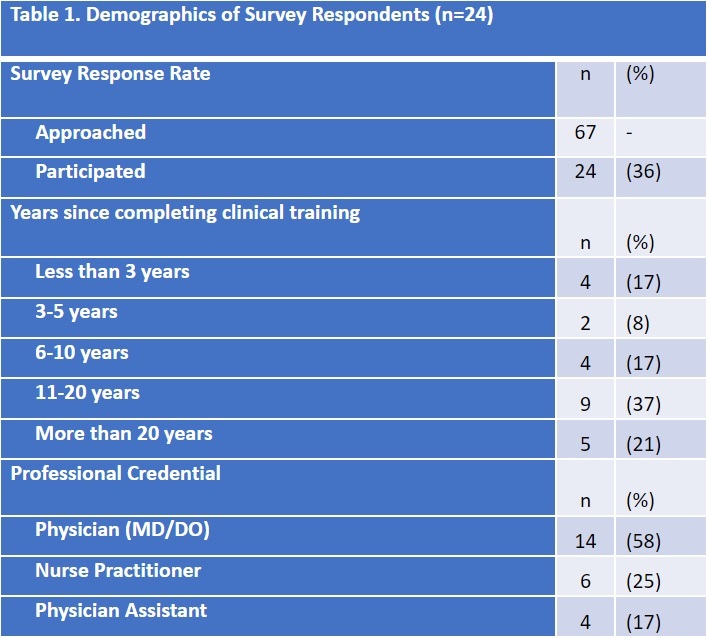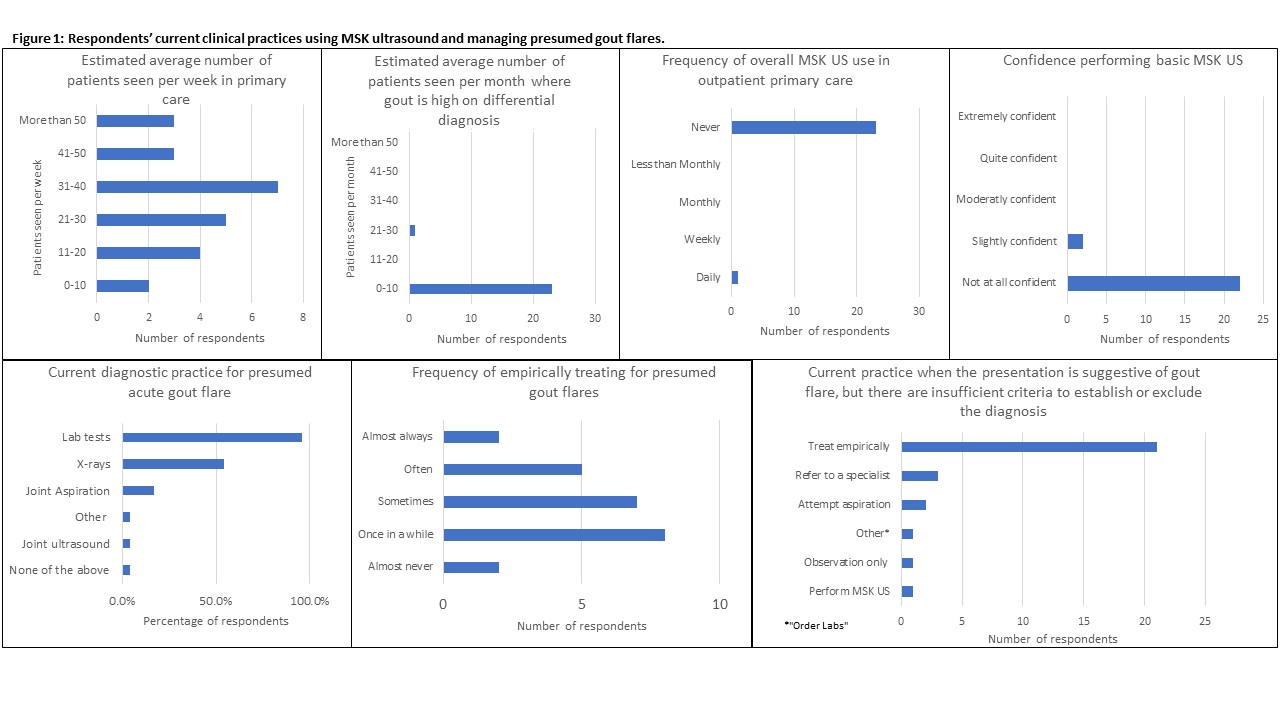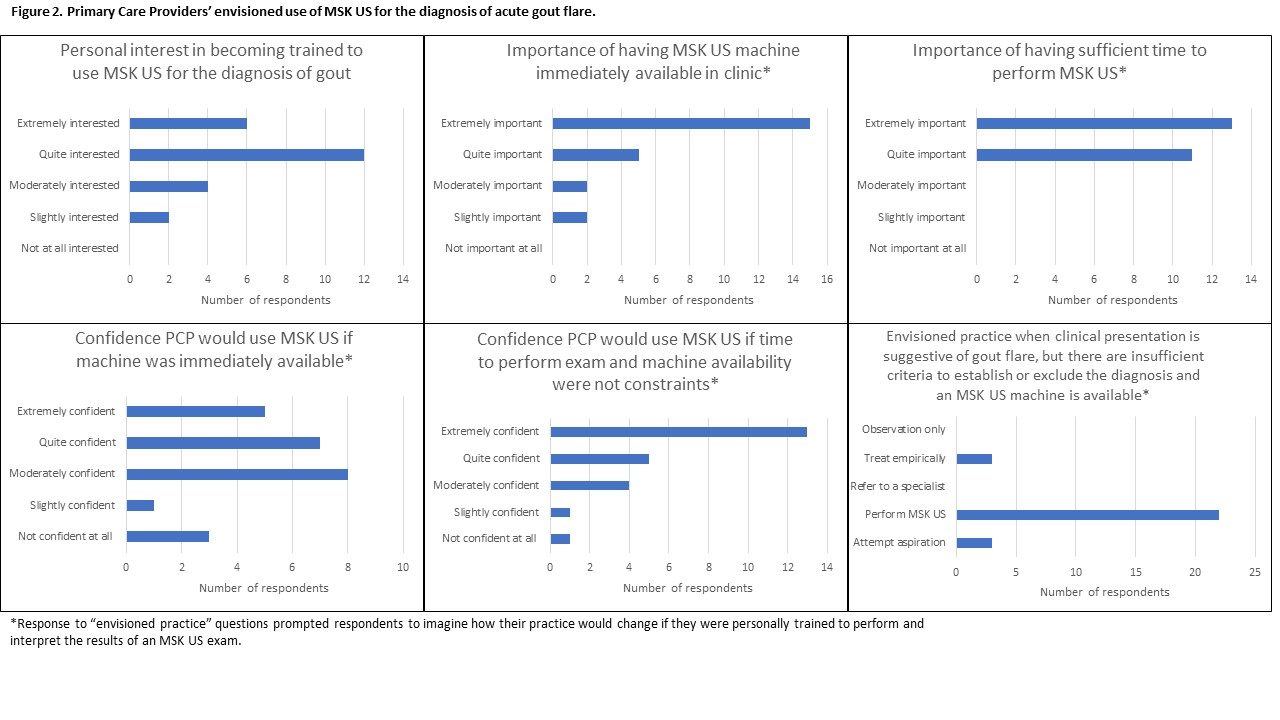Back
Poster Session A
Professional development and education
Session: (0214–0240) Professional Education Poster
0222: Primary Care Provider Utilization of Musculoskeletal Ultrasound for the Diagnosis of Acute Gout Flares: A Novel Opportunity for Rheumatology-Focused Educational Curricula
Saturday, November 12, 2022
1:00 PM – 3:00 PM Eastern Time
Location: Virtual Poster Hall
- CC
Charles Cubberley, MD
University of Utah Internal Medicine Residency Program
Salt Lake City, UT, United States
Abstract Poster Presenter(s)
Wes Cubberley1, Taylor Nelson1, Michael Battistone2, Andrea Barker2, Jeremy Timm3, Anthony Minjarez2 and Gary Kunkel1, 1University of Utah, Salt Lake City, UT, 2Salt Lake City VA, Salt Lake City, UT, 3Salt Lake City VA, Salt Lake City
Background/Purpose: Gout, the most common inflammatory arthritis, can be challenging to identify, especially when clinical criteria are insufficient to support a diagnosis. Musculoskeletal ultrasound (MSK US) can aid in this, particularly during acute flares. However, MSK US is not often used in primary care settings when patients present with inflammatory arthritis suggestive of acute gout. Given its recent emergence in medical education, most practicing primary care providers (PCPs) are unlikely to have had training in MSK US, and thus a gap in knowledge and technical skill exists. The aim of our study was to assess PCPs' experiences, interest, and perceived barriers to using MSK US in diagnosis of gout flares. This project is part of a broader needs assessment to inform a continuing professional development (CPD) program for PCPs.
Methods: A pilot survey was developed and Messick's framework was used to evaluate validity evidence from content and response process. 3 rheumatology faculty and 2 PCPs defined 2 constructs of interest through literature review and reflective critique. These were: 1) PCPs' current practices using MSK US when considering gout and 2) envisioned barriers to using MSK US in PCP clinics. The survey was systematically reviewed for relevance to the constructs and clarity of each item. Content validity index (CVI) was calculated for each item and items with a CVI < 0.8 were eliminated. Cognitive interviewing then clarified the mental model emerging through survey use. The final survey was distributed for pilot testing on REDCap® software to 67 PCPs at several Veterans Affairs primary care clinics from 5/10/2021 to 10/19/2021.
Results: The final survey contained 17 items. 24 participants (response rate = 36%) completed the survey (Table 1). Reported practice patterns for PCPs are represented in Figure 1. Respondents' diagnostic approach included lab testing and x-rays, and over half treated presumed gout flares empirically at least "sometimes". Regardless of professional credential or experience, respondents did not report confidence in their ability to use MSK US; most reported strong interest in developing this skill (Figure 2). PCPs signaled that given minimal disruption to clinical workflow and US machine availability, they envisioned incorporating MSK US in their workplace.
Conclusion: Despite the currently limited utilization of MSK US for the diagnosis of gout in primary care settings, PCPs have strong interest in learning to use MSK US to evaluate patients presenting with possible gout, indicating they would use MSK US if a machine were available and they had the knowledge to operate and interpret the findings of their examinations. These findings support development of curricula targeted to practicing PCPs interested in learning MSK US for the diagnosis of gout flares. Because content expertise rests with rheumatologists, this represents an opportunity for clinician-scholar-educators to collaborate with PCP leaders with context expertise in developing a new rheumatology-related curricula for CPD.



Disclosures: W. Cubberley, None; T. Nelson, None; M. Battistone, None; A. Barker, None; J. Timm, None; A. Minjarez, None; G. Kunkel, None.
Background/Purpose: Gout, the most common inflammatory arthritis, can be challenging to identify, especially when clinical criteria are insufficient to support a diagnosis. Musculoskeletal ultrasound (MSK US) can aid in this, particularly during acute flares. However, MSK US is not often used in primary care settings when patients present with inflammatory arthritis suggestive of acute gout. Given its recent emergence in medical education, most practicing primary care providers (PCPs) are unlikely to have had training in MSK US, and thus a gap in knowledge and technical skill exists. The aim of our study was to assess PCPs' experiences, interest, and perceived barriers to using MSK US in diagnosis of gout flares. This project is part of a broader needs assessment to inform a continuing professional development (CPD) program for PCPs.
Methods: A pilot survey was developed and Messick's framework was used to evaluate validity evidence from content and response process. 3 rheumatology faculty and 2 PCPs defined 2 constructs of interest through literature review and reflective critique. These were: 1) PCPs' current practices using MSK US when considering gout and 2) envisioned barriers to using MSK US in PCP clinics. The survey was systematically reviewed for relevance to the constructs and clarity of each item. Content validity index (CVI) was calculated for each item and items with a CVI < 0.8 were eliminated. Cognitive interviewing then clarified the mental model emerging through survey use. The final survey was distributed for pilot testing on REDCap® software to 67 PCPs at several Veterans Affairs primary care clinics from 5/10/2021 to 10/19/2021.
Results: The final survey contained 17 items. 24 participants (response rate = 36%) completed the survey (Table 1). Reported practice patterns for PCPs are represented in Figure 1. Respondents' diagnostic approach included lab testing and x-rays, and over half treated presumed gout flares empirically at least "sometimes". Regardless of professional credential or experience, respondents did not report confidence in their ability to use MSK US; most reported strong interest in developing this skill (Figure 2). PCPs signaled that given minimal disruption to clinical workflow and US machine availability, they envisioned incorporating MSK US in their workplace.
Conclusion: Despite the currently limited utilization of MSK US for the diagnosis of gout in primary care settings, PCPs have strong interest in learning to use MSK US to evaluate patients presenting with possible gout, indicating they would use MSK US if a machine were available and they had the knowledge to operate and interpret the findings of their examinations. These findings support development of curricula targeted to practicing PCPs interested in learning MSK US for the diagnosis of gout flares. Because content expertise rests with rheumatologists, this represents an opportunity for clinician-scholar-educators to collaborate with PCP leaders with context expertise in developing a new rheumatology-related curricula for CPD.



Disclosures: W. Cubberley, None; T. Nelson, None; M. Battistone, None; A. Barker, None; J. Timm, None; A. Minjarez, None; G. Kunkel, None.

